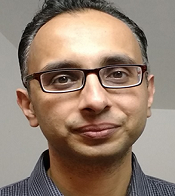


Visiting Professor
Divecha Centre for Climate Change
Indian Institute of Science,
Bengaluru-560012
Karnataka
India
Email: viraj@iisc.ac.in
Tel: +91-80-2293-3144
B.Sc, 1998, Mathematics , St. Stephen’s College, Delhi University.
M.Sc, 2000, Applied Statistics and Informatics, IIT Bombay.
M.S. 2004,Computer Science,University of Illinois at Urbana-Champaign.
Ph.D, 2007, Computer Science, University of Illinois at Urbana-Champaign.
CLIx: Connected Learning Initiative (with Tata Institute of Social Sciences)
MEC: Massively Empowered Classrooms (with Microsoft Research India)
NPTEL: National Programme for Technology Enhanced Learning
NPAT: National Programming Aptitude Test (with ACM India, NPTEL and Google)
CSIR: Computer Science Instructional Repository (with ACM India and Microsoft Research India)
2018 – present :
Visiting Professor, Divecha Centre for Climate Change, IISc
2013 – 2018 :
Professor in Computer Science, PES University
and Chief Consultant, Technical Secretariat to the Committee to draft the National Education Policy, MHRD
2011 – 2013 :
Assistant Professor in Computer Science, NIIT University
2009 – 2011 :
Visiting Lecturer, Department of Computer Science, University of Illinois at Urbana-Champaign
2007 – 2009 :
Assistant Professor, College of the Holy Cross, Worcester, Massachusetts